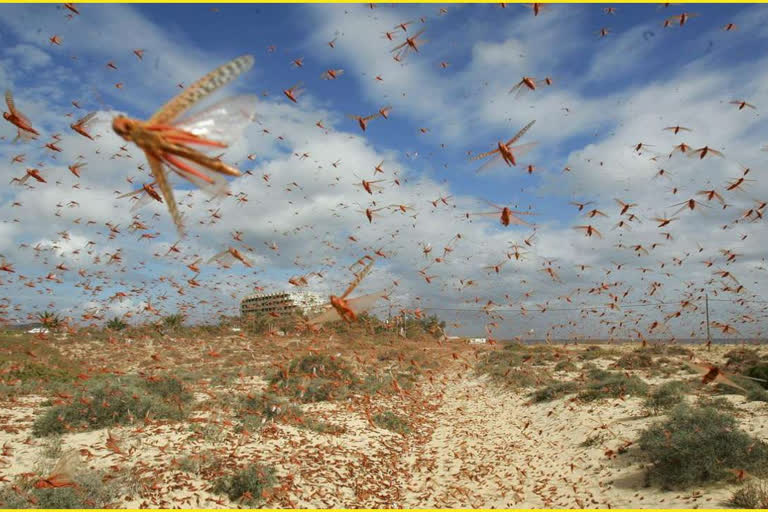Chennai: Is the invasion of locusts, destroying crops and greenery, a crisis or an opportunity? A Trichy-based Start-Up is engaged in finding a solution to the crisis through the use of modern technology. Striving to turn the calamitous crisis into an opportunity, it aims to protect the food crops by dispensing with the usual chemical pesticides.
Even as the country is battling the coronavirus pandemic, which shows no sign of subsiding despite the extended nation-wide lockdown, the invasion of locusts is fast emerging as yet another disaster. Standing crops in vast swathes of land in North India have already been destroyed, threatening the food security of crores of Indians. Legions of locusts are moving to fresh pastures at an alarming pace. While experts and scientists consider this as a catastrophe, which is still unfolding, a start-up sees this as an opportunity and has plunged headlong to find a technology-based solution so as to make it beneficial to the farming community.
Harmful Chemicals and Pesticides
To contain the devastation caused by locusts various strategies including spraying pesticides in the farmlands through helicopters and drones as well as fire tenders are being employed. However, these methods have invited criticism from environmentalists who caution that pesticides and chemicals pose long term health hazards for humans and animals. While the poisonous chemicals eliminate the locusts, they also destroy the micro-organisms, turning the land infertile.
A Start-Up Gives Hope
Even as there are parallel researches to manufacture bio-pesticides which are harmless, a start-up based in Trichy is engaged in providing a solution by gainfully employing state of the art technology. “Locusts are rich in protein which should be seen as a resource. Moreover, it could be used either as manure in the farmlands or as poultry feed,” says Mohammed Ashiq Rahman, CEO of the start-up, Propeller Technologies.
The start-up has tied up with reputed entomologists, engaged in the current war against the invasion of locusts, Aero Space which is a pioneer in drone technology and M Auto group, a leader in alternative initiatives. Propeller has teamed up with them to find ways and means to contain the locust attack.
“Of the many suggestions put forward to tackle the locust menace, the most prominent is the use of chemical pesticides. Spraying of pesticides helps in both preventing and killing the locusts. While it is true that the locusts cause huge destruction to crops, they also happen to be rich in proteins and this should be seen as a resource that has to be harvested. The locust invasion hence should be turned into an opportunity to employ modern technology to capture the locusts alive,” explains Ashiq. A well thought out plan has been designed for this purpose, he added.
